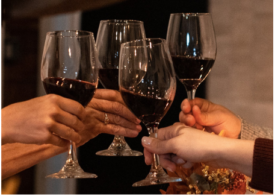How do you know? It’s a question often asked…in song, in film, in life. How do you know you love someone? How do you know someone loves you? How do you know which job to accept? How do you know your spaghetti sauce has enough oregano? Is it important to know how we know? Is it enough to just know? These questions have fascinated me for years in regard to Zero Balancing.
On the one hand, it can be very helpful to know how much structure to use or how long to hold a pause. But does investigating how we know have value? As in many Glass of Wine conversations, there may not be a definitive answer. Yet asking yourself these questions will hopefully lead you in some interesting directions!
When we consider how we know the spaghetti sauce is properly seasoned, we might identify that we are using our sense of taste. There is usually a signature taste for “enough oregano” unique to each cook. In this instance, knowing how we know is fairly easy and if we needed to teach someone how to season spaghetti sauce, we would likely instruct them to rely on their own sense of taste and preference.
Knowing whether we love someone might be a bit more complicated. There may be multiple streams of information from sensory organs, intuition, beliefs, or the opinions of others. If there is a recognizable signature feeling in one’s body it likely doesn’t originate from a single source. However, like learning the “enough oregano” taste, once we learn the “I love this person” feeling, we should be able to recognize its presence or absence fairly easily, shouldn’t we?
What if it’s someone we feel we shouldn’t love or someone we are afraid might not love us back? What if there is some situational aspect that clouds our internal feedback? Perhaps we feel frightened or anxious and the strength of those body signals overrides the “I love this person” feeling? In this instance, would knowing how we know be helpful? Could it provide us with a more nuanced experience that might help us navigate the cloudiness to find more clarity?
How do we know what we are doing when we give a Zero Balancing session? How do we know a fulcrum is working or that our client is expanded? In Core ZB classes, we learn to watch for working signs and listen for voice quality. We learn to recognize the feeling of held energy in bone. We learn to use touch, vision and hearing for feedback. In more advanced classes, we learn internal feedback signals that help identify our own state of expansion.
Is that all you need to know what you are doing? If the session has gone beautifully or not beautifully, how did you know? How can you determine your client is deeply processing versus dissociating? Where in your body do you get signals? Are you receiving information from sources other than vision, hearing and touch?
Do your signals remain clear if you are working on someone you want to impress? What if you feel intimidated? If the situation is fraught, would more self-awareness of how you know what you are doing be helpful? Could it provide a road map out of the tangle of emotions you might feel if your ZB session is going awry? Or direction toward something else to focus your attention on?
I hope this stimulates your curiosity about your own process. Thanks for reading!

